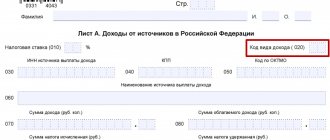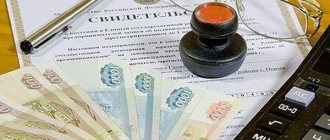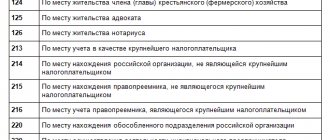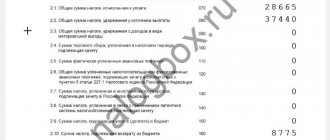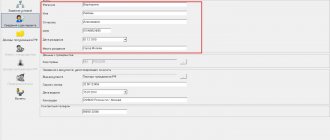What changed
From January 1, 2021, the list of non-taxable personal income tax includes:
| Type of income | Norm of the Tax Code of the Russian Federation | Explanation |
| Payment for travel to and from vacation destinations for employees living in the Far North and equivalent areas | New edition of clause 1 of Art. 217 (paragraph 10) | This also includes: • cost of transportation of luggage weighing up to 30 kg; • the cost of travel for non-working family members (husband, wife, minor children actually living with the employee); • the cost of carrying their luggage. Until 2021, there was also no need to pay personal income tax on such compensation, but according to the general norm of clause 3 of Art. 217 NK. That is, there was no special norm, so disputes arose. |
| Payment for additional days off to care for a disabled child | New clause 78 art. 217 | Applies to income received no earlier than 2021 These days are set in accordance with Art. 262 of the Labor Code of the Russian Federation for persons (parents, guardians, trustees) caring for disabled children. For a long time the issue was controversial. Recent court practice and departmental explanations tended to suggest that there is no tax. |
| Income in cash and in kind related to the birth of a child and paid in accordance with the law | New paragraph 77 of Art. 217 | Applies to income received no earlier than 2021 and paid according to:
|
| One-time compensation to medical workers not exceeding 1 million rubles, which are financially supported by a state program approved by the Government of the Russian Federation. | New edition of clause 37.2 of Art. 217 | Applies to payments, the right to receive which arose from 01/01/2018 to 12/31/2022 inclusive. Until 2021, only one-time compensations under Art. 51 of the Federal Law on Compulsory Medical Insurance dated November 29, 2010 No. 326-FZ. |
| One-time compensation for teachers up to 1 million rubles received under the state program. | New edition of clause 37.2 of Art. 217 | Introduced the Law of September 29, 2019 No. 325-FZ into the Tax Code of the Russian Federation. Applies to payments, the right to receive which appeared in 2020-2022. |
| Reimbursement of expenses for housing and communal services, incl. solid waste management services. | New edition of paragraph 3, clause 3, art. 217 Tax Code of the Russian Federation | Until 2021, only compensation related to the free provision of residential premises and utilities, fuel or corresponding monetary compensation was not taxed |
| Monetary compensation in exchange for a land plot due from state or municipal property, if it is established by the legislation of the Russian Federation or the region | New clause 41.2 of Art. 2017 | Applies to income received from the 2019 tax period |
| Income in cash and/or in kind received by certain categories of citizens as part of providing them with social support (assistance) in accordance with the law | New clause 79 of Art. 217 | Applies to income received from the 2019 tax period |
| Annual cash payment to honorary donors | new clause 80 art. 217 | Condition: have the appropriate badge. Regulated by Federal Law No. 125-FZ of July 20, 2012 “On the donation of blood and its components.” |
Financial assistance provided by educational organizations:
| New edition of clause 28 of Art. 217 | Applies to no more than 4,000 rubles per tax period |
General personal income tax
As a general rule, personal income tax is paid not at the expense of the employer, such as, for example, insurance premiums from employee salaries, but at the expense of the employee, by subtracting the tax from his income. The standard rate for residents of the Russian Federation for official employment is 13%, and for non-residents of the Russian Federation - 30% (with the exception of highly qualified specialists, for whom the personal income tax rate is 13%).
Important! The Russian Government plans to reduce in 2021. The personal income tax rate for non-residents is up to 13%.
The tax is initially withheld from the employee’s income and then transferred to the state budget. At the same time, transfer of personal income tax is possible only after the income is paid to the employee - issued in cash through the cash register or transferred to a bank account.
Violations of personal income tax legislation include the following important points:
- the employer assumes the burden of personal income tax, that is, transfers his own money, and not withheld from the individual’s income (if he transfers the tax before the payment of income);
- the employer shifts the responsibility of calculating and remitting tax to the employee himself. The company is a tax agent for personal income tax, and therefore it must directly calculate, withhold and transfer the tax to the state budget. The employee receives a salary or other income minus the amount of calculated and withheld tax.
The timing of personal income tax transfers depends on what type of income the employee receives. In some cases, the tax must be transferred no later than the next day after the payment of income, for example, payment for labor under an employment or civil service contract. In other cases, personal income tax must be transferred before the end of the month in which the income was paid, for example, for vacation pay or sick leave.
What else you need to know about income without personal income tax
Basically, the corresponding changes to the Tax Code of the Russian Federation were made by Federal Law No. 147-FZ of June 17, 2019 (hereinafter referred to as Law No. 147-FZ).
In general, payments related to state benefits and compensation and listed until 2021 in paragraphs 1 and 3 of Art. 217 of the Tax Code of the Russian Federation, are now combined into one paragraph - the first. Accordingly, the third paragraph will no longer apply.
Also, starting from 2021, the norm (clause 69 of Article 217 of the Tax Code of the Russian Federation) on the composition of non-taxable income of veteran soldiers has been expanded. In essence, the new edition consolidated the rules established for 2021.
In addition, from 2021, the new paragraph 76 of Art. 217 of the Tax Code of the Russian Federation exempts from tax payments to citizens exposed to radiation (Chernobyl, Semipalatinsk, Mayak).
Also see: What's Income Tax Changes in 2021: Full Review.
Read also
28.11.2019
Tax deductions
Tax deductions are amounts based on which the tax base is reduced. Tax deductions can be standard, social or property. Some of them can be obtained both through the employer and through the tax office, while others can only be obtained through the Federal Tax Service.
The most common is the standard deduction for children. As a rule, the right to receive them is associated with a minimum package of documents provided by the taxpayer. The deduction depends on how many children an individual has and who they are (parent, adoptive parent, guardian, etc.).
Social deductions are mainly received for expenses on education or treatment, both for yourself and for your immediate family. Property deductions are associated with the purchase of real estate - both in cash and by concluding a loan agreement.
The provision of almost all tax deductions is based on the fact that there is a specific limit, if exceeded, the taxpayer loses the right to use them. For example, for standard deductions for children, the limit is 350,000 rubles. total income for the period starting from the calendar year. For the property deduction when purchasing real estate, the deduction is 2 million rubles.
Results
When receiving income subject to personal income tax during the tax period, it is necessary to: clarify the tax rate for this type of income, calculate the tax base (including deductions) and calculate the amount of tax (multiply the tax base with the tax rate).
When receiving several types of income taxed at different personal income tax rates, the tax base is calculated separately for each type of income.
Sources: Tax Code of the Russian Federation
You can find more complete information on the topic in ConsultantPlus. Free trial access to the system for 2 days.
How to calculate personal income tax on wages in 2021
In order to calculate personal income tax on wages, you need to use a special formula, which looks like this:
N = PS x OS, where:
N - personal income tax, PS - interest rate, OS - taxable amount.
Please note that in order to determine the fixed assets, it may be necessary to make additional calculations due to the fact that tax deductions may be used on the income side.
OS = DC - V, where:
DC - income part of the person, B - deductions.
How to transfer personal income tax to a tax agent
Starting with the payment of tax for the periods of 2021, the amended procedure applies. Everything will depend on the amount of tax for each individual.
If not a single employee of a company (separate division) or employee of an individual entrepreneur has a total base that has exceeded 5 million rubles since the beginning of the year, the tax should be transferred in one payment.
If the total base of at least one employee has exceeded 5 million rubles since the beginning of the year, the tax should be transferred in two installments. The first includes personal income tax related to bases of 5 million or less. The second is personal income tax related to bases over 5 million.
REFERENCE
For tax “over 650 thousand rubles.” a separate KBK was introduced - 182 1 01 02080 01 0000 110. This code, as well as separate KBK for the payment of penalties and fines for late payment of the 15% tax, were approved by order of the Ministry of Finance dated 10.12.20 No. 236n (see “KBC established for the payment of personal income tax at a rate of 15%).
Automatically generate a tax payment invoice based on data from the declaration
For what income does the 13% rate remain?
There are three types of income for which the combined rate of “650 thousand rubles. + 15%" does not apply regardless of the payment amount. These include:
- income from the sale of real estate (except for securities) or shares in it;
- income in the form of the value of property (except for securities) received as a gift;
- taxable insurance payments under insurance contracts and pension payments.
An important detail: the personal income tax rate of 13%, which does not depend on the amount of the specified income, is provided only for residents of the Russian Federation. This is stated in the new paragraph 1.1 of Article 224 of the Tax Code of the Russian Federation.
Personal income tax in 1C
When calculating personal income tax in the 1C:ZUP program, you must make the following settings:
- check that standard deductions are applied on an accrual basis during the tax period;
- analyze whether the income codes are indicated correctly, since they will be reflected in personal income tax reporting;
- set up personal income tax taxation for each type of accrual and deduction.
Personal income tax must be calculated for each amount of actually accrued income for each month separately. Tax is calculated by various documents depending on the type of income - vacation, sick leave, payroll, etc.
When closing the salary month, the document “Accrual of salaries and contributions” will reflect all amounts of income, deductions provided, as well as calculated and withheld taxes. This information is reflected in both accounting and tax accounting, that is, it ends up in the appropriate tax accounting registers.
Based on this information, reporting is generated to the Federal Tax Service, for example, certificates in form 2-NDFL or calculation of 6-NDFL. In the future, you can take advantage of the possibilities of transferring data directly from the program through the 1C: Reporting service, which is included in ITS PROF.
Money as a gift
You can now receive money as a gift without paying taxes not only from close relatives, but also from people of varying degrees of acquaintance. But be careful if you are an official: a gift may be considered a bribe.
You can also accept gifts in kind, if it is not an apartment, a car, shares or shares. If any of the above is not given to you by a close relative, you will have to pay personal income tax.
A money transfer to a card, if it is a gift, is also not subject to tax.
When a taxpayer independently calculates personal income tax
Individual entrepreneurs and persons engaged in private practice (notaries, lawyers, etc.) themselves account for income from their activities, calculate personal income tax and pay it to the budget.
In general, those who receive income from the sale and rental of property, income in the form of winnings in the lottery or other gambling games, as well as income from any foreign sources (the latter applies only to residents) also calculate the tax themselves.
In addition, the following persons must calculate and transfer the tax to the budget with their own hands: those who received gifts from individuals who are not registered as individual entrepreneurs (with the exception of property, cars and shares donated by relatives); heirs of copyrights to works of art, scientific discoveries, etc.
Finally, individuals who received money from an employer (or other tax agent) who for one reason or another did not withhold tax are required to pay personal income tax. Tax calculations are made by tax authorities. They record the received amount in a notification that is sent to the individual. The latter can only transfer the money based on the notification received. There is no need to submit a declaration.
Who and how is tax calculated and paid?
Usually the employer calculates and pays personal income tax, but sometimes citizens are required to submit their own income tax return. In this case, a calculator is indispensable; it can be used to calculate the exact tax amount in a few seconds.
If a person is an individual entrepreneur who works under the OSN or has, in addition to wages, additional income from renting out housing or receiving dividends, by March 31 of the next year he must calculate personal income tax and submit a declaration to the Federal Tax Service. Tax payment is due until July 15 inclusive. An online calculator will help you calculate the amount of your tax payment.
How to use the calculator?
Suppose we need to calculate and subtract tax from the salary using a personal income tax calculator in order to find out how much will be accrued as receivable.
To calculate on the personal income tax calculator from the amount in hand:
- open the online calculator form on the website and select the personal income tax rate: 13 percent or 30 percent.
- indicate the amount of earnings before deduction;
- click the "Calculate" button.
After the personal income tax calculation is completed, information about the accrued tax and income after all deductions will appear on the screen. If you have already received the money in your hands and want to calculate your earnings before paying personal income tax, enter the initial value in the “amount without personal income tax” column and click “Calculate”.
